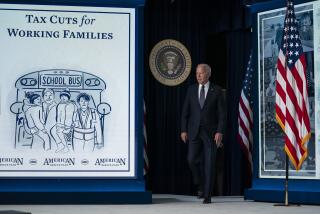For Children With Credit Cards, Responsibility Comes at Early Age : Banking: Credit is a fact of life, even for teens, a Denver bank maintains, but consumer groups have criticized the program.
- Share via
DENVER — Would you give a credit card to a teen-ager? Linda Fingersh would.
“We felt that it would be to his advantage to learn about credit now in a small, controlled environment,” said Fingersh, who helped her 13-year-old son, Adam, get a credit card from the Young Americans Bank. “He’s very, very responsible and that’s why we co-signed.”
More than 300 teen-agers have applied for credit cards since they were offered Aug. 3, said Leanne Cadman, a loan officer at the bank. Ten have been approved so far, but the bank noted that many applications are still being processed.
The bank’s premise is simple: Credit is a fact of life, and every youngster needs to learn how to use it responsibly. “What we’re trying to do is to teach them . . . to make sure what you’re buying is worth it,” Cadman said.
The card has a $100 limit and is available to people who are at least 12 years old who have had a savings account with a minimum $10 balance for at least six months. Applicants must have an adult co-signer. The annual fee is $15, and the card carries an 18.8% annual percentage rate.
Deb Breeling, a spokeswoman at the bank, said other banks offer credit cards in children’s names on their parents’ accounts, but, “as far as just having it in the child’s name, I think ours is the only one.”
Adam Fingersh said the card will help teen-agers learn the proper use of credit.
“At some point, we’re going to have to learn about credit. It’s better to learn with a $100 limit,” said Adam, who plans to use his card mainly in his T-shirt business, Adam’s Designs.
Consumer-oriented groups, such as the National Center for Financial Education, have criticized the bank’s program, claiming it teaches “buy now and pay later.”
“Credit card abuse and the overspending that credit cards are leading to is a very serious problem in our society,” said Loren Dunton, executive director of the San Diego-based center. The nonprofit organization has launched a drive to discourage credit cards for teen-agers.
“Our campaign is to discourage other banks from following suit around the country,” he said. “You can teach firearms without giving kids a loaded gun. You can teach credit card responsibility without giving young teens a credit card.”
Jeanne Goody, director of education for the nonprofit Consumer Credit Counseling Service in Denver, said: “I can see no reason in the world why a 12-year-old should have a credit card. . . . I think it was a really bad idea.”
Fingersh said her son has friends whose parents have gotten into financial trouble with credit cards. She has seen teen-agers out on their own at 18 “go like crazy” when they obtain their first credit card.
She does not want that to happen to Adam.
Two other banks that cater to children have no plans to add a credit card to their services.
“That’s a nightmare that I don’t want to get into,” said Sherrie Avery, liaison between First National Bank of South Miami and its Twiglet Bank at David Fairchild Elementary School.
Twiglet, which opened in November, 1987, is a commercial bank operated by students. It offers checking and savings accounts, and has about $14,000 in deposits and more than 400 accounts. Customers must be students at the school.
The First Children’s Bank inside the F.A.O. Schwarz Toy Store is a division of the First New York Bank for Business. It offers checking and savings accounts and a college certificate of deposit plan, but has no plans to add a credit card, said Mary Quinn-Cordero, a bank spokeswoman.
Insured by the Federal Deposit Insurance Corp., the 2-year-old Young Americans Bank has more than 9,350 depositors with $5.9 million in deposits. It offers checking and savings accounts and loans, and sponsors seminars on financial issues from balancing checking accounts to planning for college.
Customers, who range from newborn to 22 years, live in 37 states and six foreign countries.
More to Read
Inside the business of entertainment
The Wide Shot brings you news, analysis and insights on everything from streaming wars to production — and what it all means for the future.
You may occasionally receive promotional content from the Los Angeles Times.









